Metacast: 2024 in review, plans for 2025
The rose, the gold, the deep blue, and the shades of gray of bootstrapping a startup.
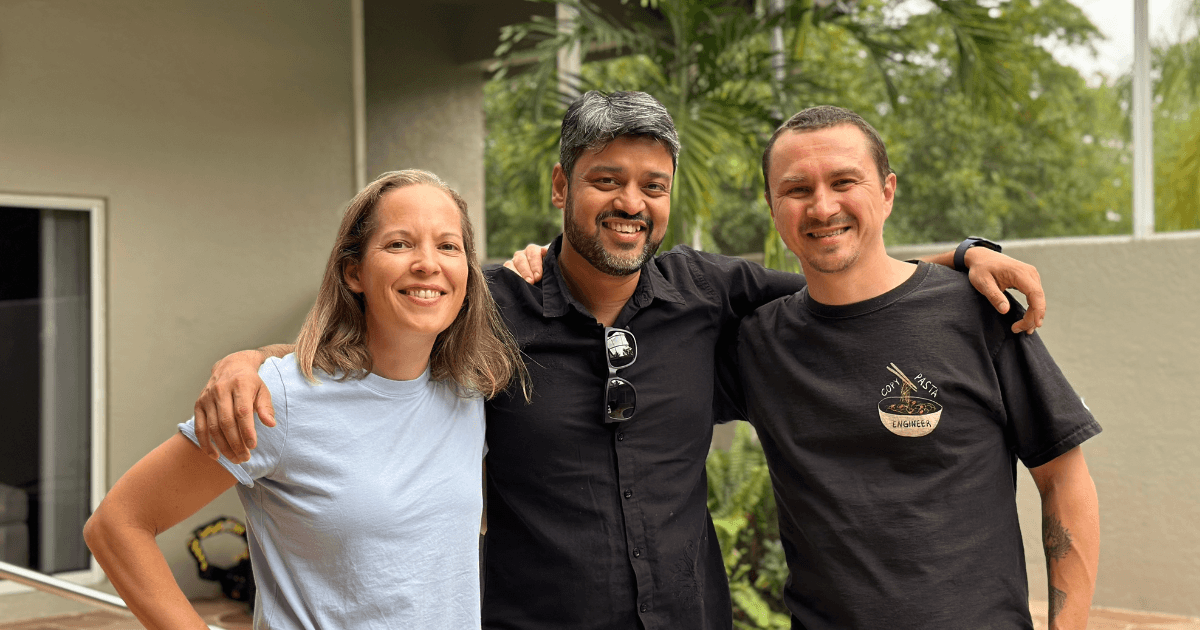
Table of Contents
Overview
In 2024, we were not consistent with updates about our bootstrapping journey with Metacast, a podcast app with transcripts that helps professionals get the most knowledge out of podcast listening.
The year was both exciting and challenging, both on business and personal fronts. We got to experience the rose, the gold, and the shades of gray of bootstrapping a new venture.
This large post is an unfiltered reflection on the year.
Where we started
The team
At the start of the year, there were three of us – Arnab Deka, Ilya Bezdelev, and Jennie Buechner.
We all came from the AWS Chatbot team where Arnab and Jennie were software engineers and I was a product manager. In 2022-2023, all of us left our cushy big tech jobs to try something new and exciting - building a product we wished had existed.
It's important to note that we set out to build a calm company, a company where people can do their job during flexible business hours and live a full life outside of work.
The product
At the start of the year, our podcast app Metacast was in closed beta. We launched the beta in August 2023, just a few months after starting the business. A dozen people were using the app and giving us feedback
The app was lacking a lot of features. We were rushing to make it "feature-complete" to launch it publicly.
The business
At the start of the year, Metacast Inc, a Delaware C-corp, was not making any money. We were not paying ourselves. Our infrastructure and tooling costs were ~$50/month.
The rose & the gold – what went well
Open beta launch
The year started with a full-on crisis.
We wanted to be ahead of the big podcast apps in providing listeners with access to transcripts of any podcast ever published...
On January 26, 2024 at 6:40am ET, Apple announced that they were adding transcripts to Apple Podcasts.
We panicked for a few hours, then decided it was time to launch the open beta, which we shipped on both iOS and Android in early February (we covered the full story of the crisis in all its emotion in our newsletter).
This is how the app looked like a year ago. We've shipped a lot of new features since then, but the core parts of the app have not changed. We believe we did them mostly right the first time!
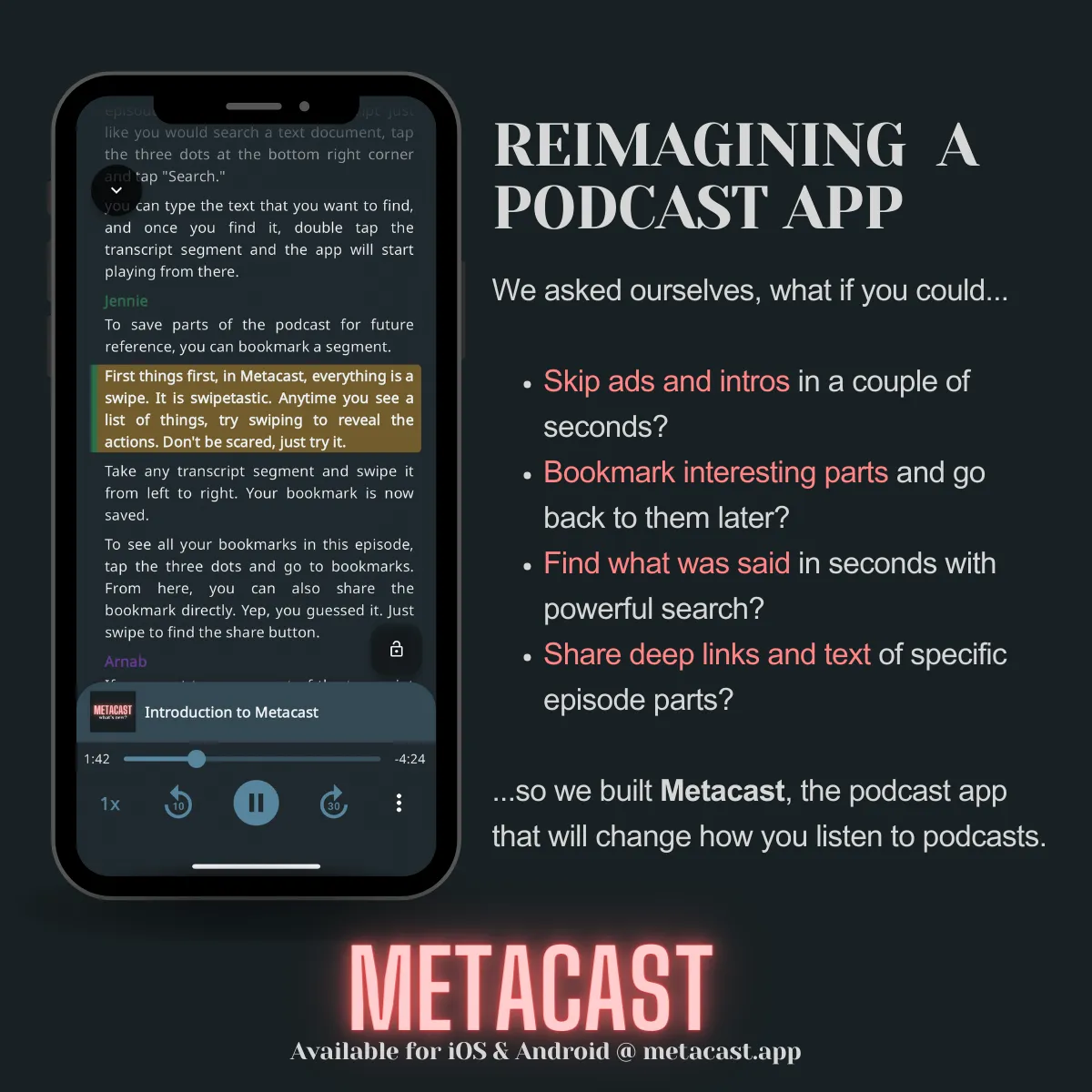
Launching the app publicly allowed us to get more feedback, both good and constructive, mostly through our subreddit r/metacastapp and emails. Many of our friends and ex-colleagues tried the app and shared their feedback.
We spent a few more months adding features, fixing bugs, and learning more about our user base.
The first all-team offsite
In April, we we had a full-team offsite in my home in Florida.
We didn't have money to book a proper "offsite," but Jennie was going to travel to Florida from Costa Rica for personal business, so we grabbed the opportunity to hold an in-person event. Our only cost was Arnab's ticket from Vancouver to Miami.

The three of us worked together on a 75" TV screen in my living room, enjoyed my signature rendition of the Thai pineapple fried rice, and had some drinks in the evening.
Together, we solved the issue that seemed unsolvable, a nasty problem with overheating Android phones. We had discussions about the future direction of the app and the state of the business.
Arnab stayed a little longer and got to know my family, ride bikes with my son, and see the John D. MacArthur state park, arguably the best beach in South Florida.
It was truly a fantastic time that we'll forever cherish as something special.
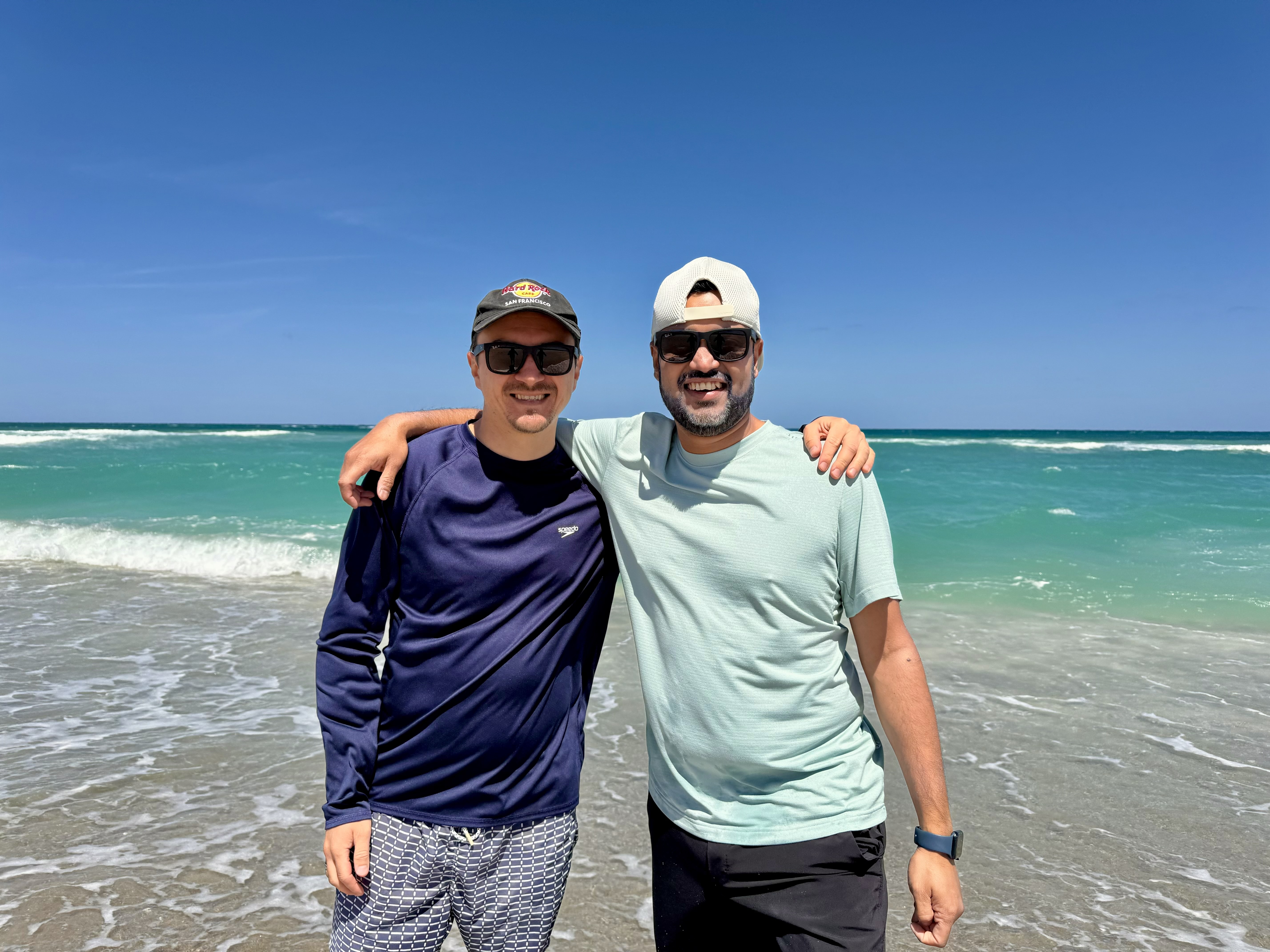
The public launch
After the open beta, we focused all of our energy on launching Metacast to app stores.
We had an iOS problem we couldn't solve, so we decided to launch on Google Play first, then swarm on the iOS issue and launch on the App Store later.
Metacast for Android launched in July. The iOS version launched in September. The first public version of Metacast had transcripts, bookmarking, playlists, and search.
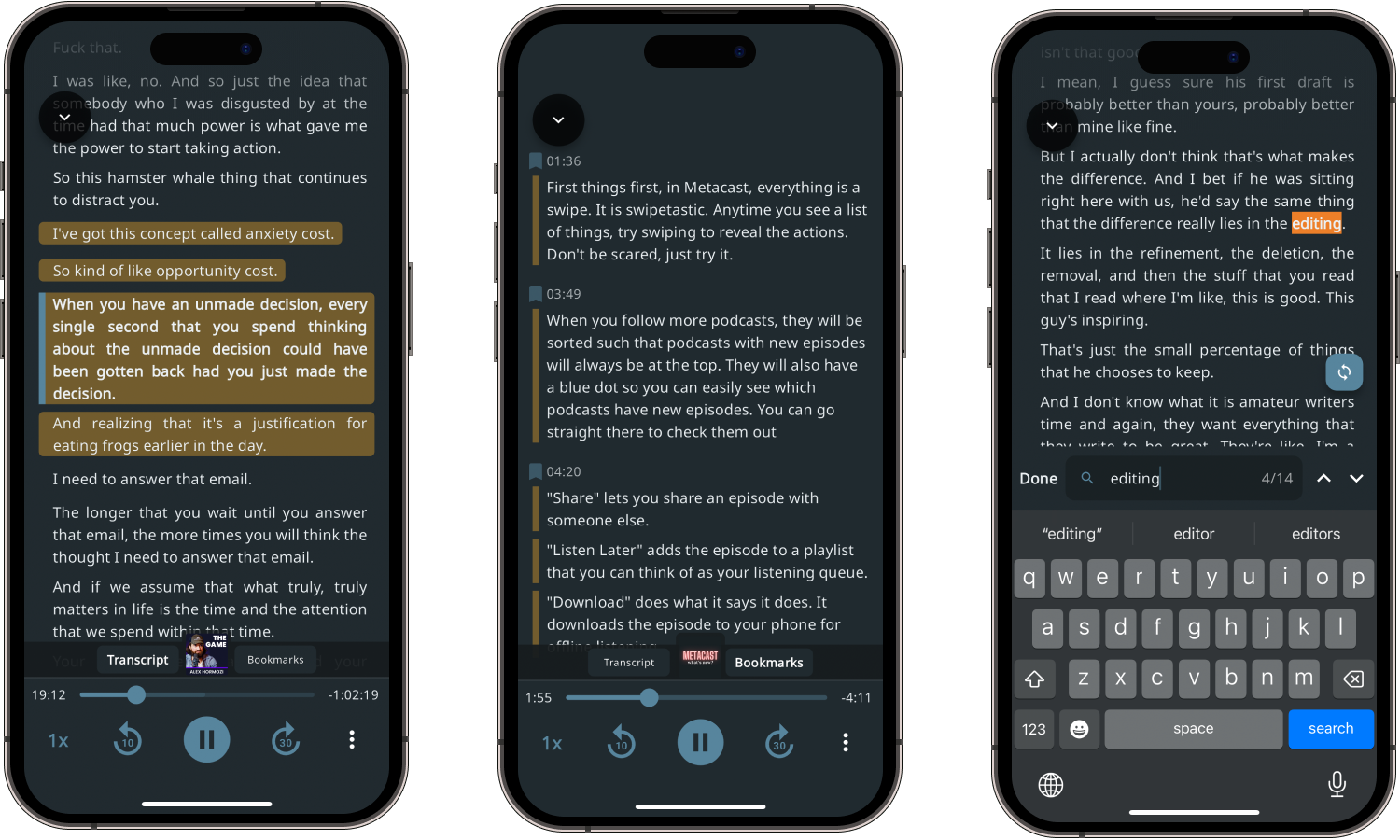
The launch was fairly smooth except a few rejections by Apple and a few violation notices from Google. We documented our entire launch journey in the case study How we launched Metacast mobile app on App Store and Play Store.
Reception by users
After the launch we got some really amazing testimonials from users.
The transcription feature is like having a personal assistant who never misses a word. Now I can find that elusive quote or subject without scrolling endlessly.
Metacast is the only app that allows me to visually bookmark what I just heard on a podcast.
The aesthetic is clean/simple/straightforward, and I prefer the dark theme by default. The logo is also cool, for what it’s worth.
Reddit being Reddit, we got some disgruntled hate on there. We offered the hater to schedule a chat with us and never heard from them again. It's easy to hate anonymously for no reason other than "haters gonna hate."
Having been in product development for many years, we choose to double-down on the things that people love, take in the constructive feedback (with a grain of salt, of course!), and ignore the haters that can't be converted into passionate supporters.
The first money
The public launch allowed us to finally start charging for the app. After over a year of working on the app and pouring our hearts, souls and money into it, we could finally see if anyone was going to pay for it.
We started Metacast Premium at a price point of $4.99/mo or $49.99/year (US Dollars), but quickly walked back on that price. We heard from people it's too expensive, it didn't compare favorably to other indie apps, and even we felt like it's too high. So, we dropped it to $1.99/mo or $19.99/year (pricing case study).
We also ran a few promotions. When we first launched and during Thanksgiving, users could subscribe to Premium for only $9.99/year.
In November, we hit a milestone of $500 in total revenue.
We ended the year with ~60 paying customers bringing in just over $80 in monthly recurring revenue (MRR).
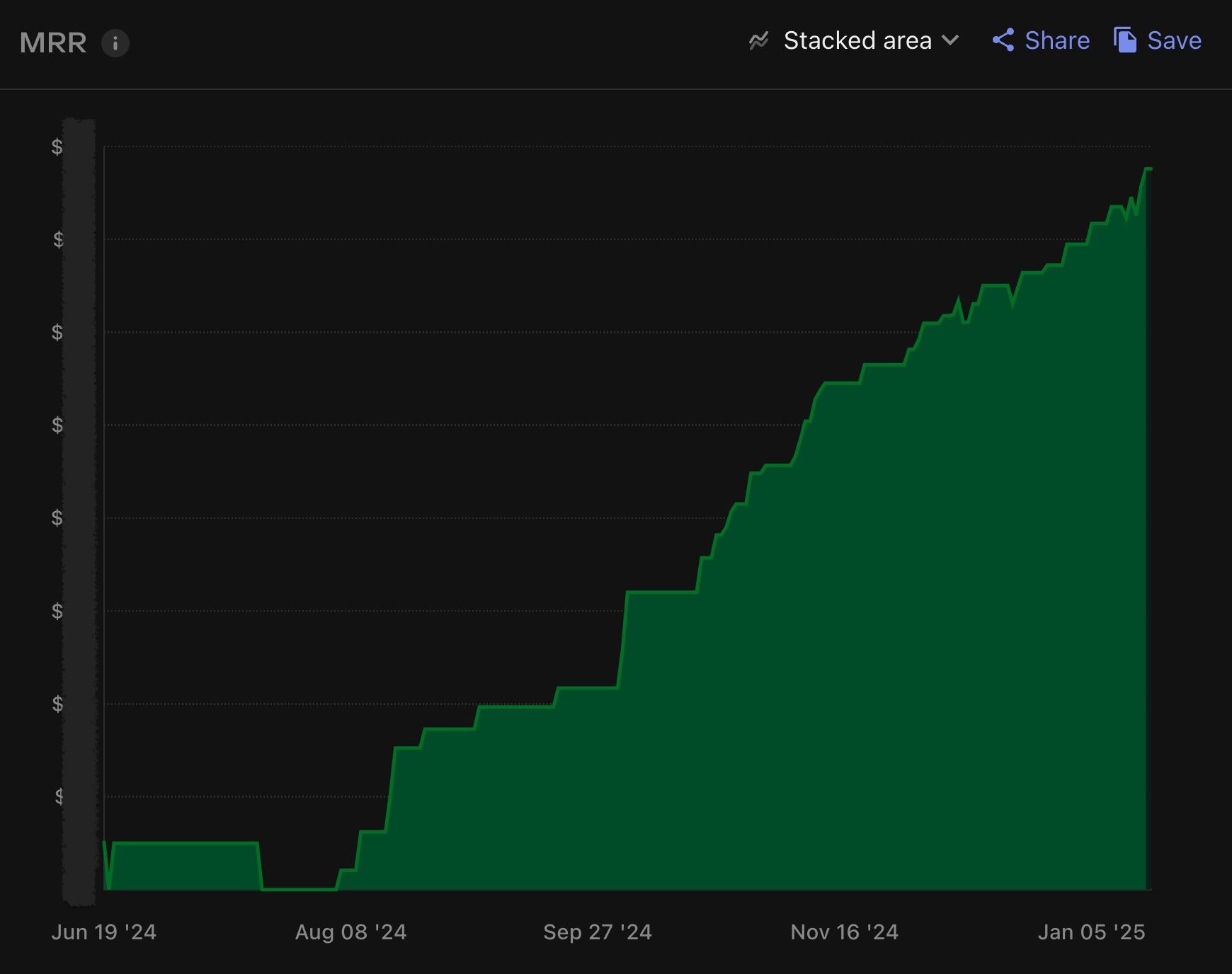
This money doesn't yet cover the infrastructure and tooling costs. We spend about $200 per month on third party software, including Google, Vercel, GitHub, Descript, Riverside, etc. But it's good to be able to offset at least some costs.
The growth has accelerated in January 2025, but that's a topic for another post!
Bonus: Indie hacker friend saved the day!
In November, we had an outage, which resulted in an unexpected win for both ourselves and a friend of ours.
Our podcast transcription jobs running on a reputable AI infrastructure startup started failing for no apparent reason. There were no errors, no nothing. We opened a ticket but didn’t hear back.
That would’ve been frustrating to say the least if not for the serendipity that followed.
A few days before the outage, an indie hacker friend of mine emailed us about his experiments with a transcription API that was faster, cheaper, and higher quality than what we were using. We started experimenting and made the switch pretty much overnight.
What started as an outage turned into a win for us, our users, and our friend. Migrating off the big service to a small indie-powered API resulted in a 5x improvement in transcript generation speed. We can now do more for our users at less cost.
The lesson? When life gives you lemons, make margaritas!
The shades of gray
We could've portrayed just how awesome it is to bootstrap a startup by publishing anonymized revenue charts, user testimonials (of which we have plenty!), and happy pictures of founders coding away on a beach while sipping cocktails.
"It's not all rose and gold. Even Apple knows that."
Arnab Deka, co-founder of Metacast
Despite all the good things and the excitement, building a company does not equal just building and marketing a product. There's a whole baggage of deep blues and dark grays that comes with it.
Let's start with the saddest part of 2024 that hit right at the end of the year.
We're down to 2 people
Jennie joined us at the end of 2023 as a software engineer, taking no salary and working for equity. She could afford that for a while after moving from the US to Costa Rica and dramatically reducing her expenses (we covered this on our podcast with Jennie).
However, life is not static, and due to personal reasons, Jennie had to move back to the US and take a full-time job that could pay a salary. She left Metacast at the end of the year.
We'll miss Jennie as the most pragmatic, no-nonsense part of the team and wish we can work together again sometime in the future ❤️
What does this mean for Metacast?
Losing a senior engineer was obviously a big hit to our productivity, so we made some changes to how we operate:
- We've become more pragmatic. We'll do fewer or even no code reviews. We'll optimize costs less. Shipped is better than perfect.
- I'm back to full-time coding. This is the discovery of the year for me personally. I'm really enjoying it after all those years of being a manager.
- We've specialized. Arnab and I now have a clean split of coding responsibilities. Arnab's time is 100% in the mobile app. I'm dedicated to the web app.
We're optimizing for shipping value to users faster. It might mean we miss an occasional bug, but at our scale we can still afford that.
Reaching a sustainable revenue stream is more important than a risk of occasional embarrassment.
Not making money is a huge distraction
We've not talked about it much on our podcast, but living off savings is not fun. All of us had to make some significant adjustments to our lifestyle until we make it work. It's a lot of sacrifice.
About a year ago, my wife and I had a discussion about money. The options were few – move to a place with a cheaper cost of living or go back to corporate. We chose to sell everything, downgrade our lifestyle, and move, so we could extend the runway for Metacast. Looking back at the last summer, it was the hardest year of my life.
Arnab and his family too had many discussions about the opportunity cost of not earning money while we work on a startup. His family had to accept the lifestyle change, become more frugal, and learn good financial habits.
Such changes are not only time-consuming and expensive. They make you second-guess your path and wake up with panic attacks. The emotional toll on a founder is real.
But in the end, there won't be any regrets for not trying. I'd rather be a broke person who followed his own path than betray my dreams to stay safe within the well-trodden path.
I want to conclude this chapter by thanking our spouses and kids for embracing the unknown and supporting their husbands and dads on the entrepreneurial path. Not surprisingly, kids are very flexible and have been able to adapt to the changes very well.
Dropping the ball on the newsletter and podcasts
In 2024, I dropped the ball on the newsletter and the podcasts.
In the previous year, we published the podcast weekly. The newsletter was coming out every other week. Never missed a bit. We interviewed some amazing people like Jason Fried, Dave Thomas and Dennis E. Taylor. We mused about bootstrapping.
We were raw and honest. We were genuinely having fun.
Then, mostly because of my life situation, we stopped interviewing people. We started slipping the "behind the scenes" schedule. I made attempts to recover my content production habit, but to no avail.
Unexpectedly, I was saved by getting back into coding. Starting in November, I spent most of my time in coffee shops working on our web app. It gave me the grounding that I was missing in life.
It also gave me the inner calm to continue with the content. This long post is hopefully a testament to this.
Parting thoughts
At the start of 2024, we were like children – happy and excited. With nothing to look forward to but more life, viral growth, and financial independence.
Then, we got a taste of reality. Building a product at "podcast scale" takes time. Building the user base takes time. The life needs to be taken care of.
2025 is the year for us. We're determined to make our Metacast dream happen.
The signs are good.
- We're seeing a good trend in user growth and engagement. Since we launched, 1.3k users played 18.5k episodes from 1.3k podcasts. More than 500 people try Metacast every month.
- The Premium sign-ups trend is encouraging. Users sign up for premium almost daily. Sometimes, multiple times per day. We've earned almost $1,000 since we launched in app stores.
- We're mostly done with the core capabilities of the app – transcripts, playlists, and search – and users use them as we intended! We're going to ship some exciting new features in the coming months (private podcasts, custom playlists and some AI stuff), making the app even more valuable to both premium subscribers and free users.
- People are enjoying the simplicity of the app. This is no accident, we prioritize simplicity in the world where all software eventually becomes bloatware.
- We're investing in SEO and are already seeing some results both on our own and on Reddit. We'll talk more about this on our "behind the scenes" podcast.
The business is growing at a bicycle pace. We need to turn it into a car drive pace. Then, into a plane ride and hopefully into a rocket ship eventually.
Here comes the grind.
Stay in touch
- Subscribe to our "behind the scenes" newsletter
- Follow Metacast: Behind the scenes podcast
- Download Metacast, a podcast app with transcripts on Apple App Store or Google Play Store